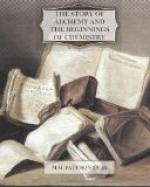The character and abilities of Paracelsus have been vastly praised by some, and inordinately abused by others. One author says of him: “He lived like a pig, looked like a drover, found his greatest enjoyment in the company of the most dissolute and lowest rabble, and throughout his glorious life he was generally drunk.” Another author says: “Probably no physician has grasped his life’s task with a purer enthusiasm, or devoted himself more faithfully to it, or more fully maintained the moral worthiness of his calling than did the reformer of Einsiedeln.” He certainly seems to have been loved and respected by his pupils and followers, for he is referred to by them as “the noble and beloved monarch,” “the German Hemes,” and “our dear Preceptor and King of Arts.”
There seems no doubt that Paracelsus discovered many facts which became of great importance in chemistry: he prepared the inflammable gas we now call hydrogen, by the reaction between iron filings and oil of vitriol; he distinguished metals from substances which had been classed with metals but lacked the essential metalline character of ductility; he made medicinal preparations of mercury, lead and iron, and introduced many new and powerful drugs, notably laudanum. Paracelsus insisted that medicine is a branch of chemistry, and that the restoration of the body of a patient to a condition of chemical equilibrium is the restoration to health.
Paracelsus trusted in his method; he was endeavouring to substitute direct appeal to nature for appeal to the authority of writers about nature. “After me,” he cries, “you Avicenna, Galen, Rhasis, Montagnana and the others. You after me, not I after you. You of Paris, you of Montpellier, you of Swabia, of Meissen and Vienna; you who come from the countries along the Danube and the Rhine; and you, too, from the Islands of the Ocean. Follow me. It is not for me to follow you, for mine is the monarchy.” But the work was too arduous, the struggle too unequal. “With few appliances, with no accurate knowledge, with no help from the work of others, without polished and sharpened weapons, and without the skill that comes from long handling of instruments of precision, what could Paracelsus effect in his struggle to wrest her secrets from nature? Of necessity, he grew weary of the task, and tried to construct a universe which should be simpler than that most complex order which refused to yield to his analysis.” And so he came back to the universe which man constructs for himself, and exclaimed—
“Each man has ... all the wisdom and power of the world in himself; he possesses one kind of knowledge as much as another, and he who does not find that which is in him cannot truly say that he does not possess it, but only that he was not capable of successfully seeking for it.”
We leave a great genius, with his own words in our ears: “Have no care of my misery, reader; let me bear my burden myself. I have two failings: my poverty and my piety. My poverty was thrown in my face by a Burgomaster who had perhaps only seen doctors attired in silken robes, never basking in tattered rags in the sunshine. So it was decreed I was not a doctor. For my piety I am arraigned by the parsons, for ... I do not at all love those who teach what they do not themselves practise.”




